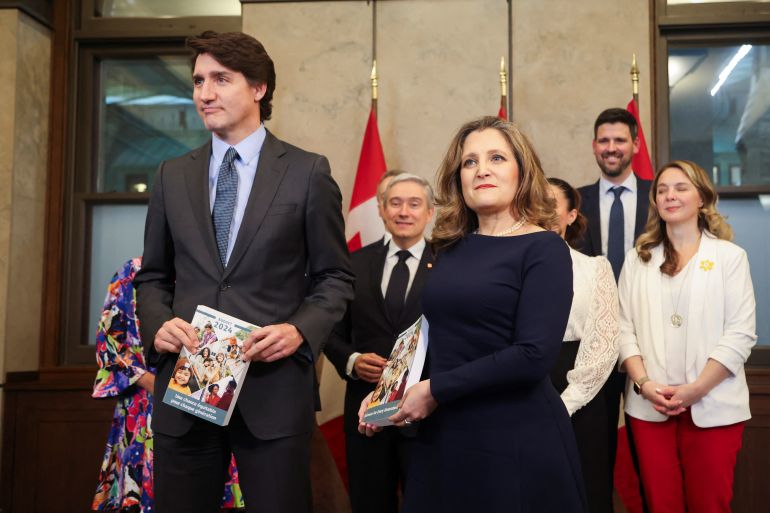Canada’s Trudeau government asks rich to pay more in pitch to Gen Z
Budget proposes higher capital gains taxes and billions in spending on education, housing, jobs and mental health.

Canada will ask the wealthy to pay higher taxes as Prime Minister Justin Trudeau’s government seeks to shore up flagging support among young voters ahead of an election expected next year.
Minister of Finance Chrystia Freeland said in the annual budget announcement on Tuesday that the wealthiest Canadians should pay more, while billions of dollars would be invested in education, housing, jobs and mental health services.
Keep reading
list of 4 itemsSeven jurors seated on the second day of Trump’s New York hush-money trial
After leaving the grind in Asia, Filipino women find exploitation in Poland
Ecuador declares energy emergency amid severe regional drought and El Niño
The budget proposes 53 billion Canadian dollars ($38bn) in new spending over five years, much of it directed towards Millennials and Generation Z in the form of affordable housing, student grants and loans, rent subsidies and work placement programmes.
Under the proposals, capital gains over 250,000 Canadian dollars ($180,804) would be taxed at 66.7 percent, up from 50 percent, raising nearly 20 billion Canadian dollars ($14.5bn) in revenue over five years.
Freeland said the opportunity for young people to build a comfortable middle-class life had “always been the promise of Canada”.
“But today, Millennial and Gen Z Canadians can get a good job, they can work hard, they can do everything their parents did and more, and too often the reward remains out of reach,” she said.
“They look at their parents’ lives and wonder: ‘How will I ever be able to afford that?'”
Freeland acknowledged that the tax hike would prompt some pushback but said the increase would ensure the wealthiest pay their fair share.
“But before they complain too bitterly, I would like Canada’s 1 percent – Canada’s 0.1 percent – to consider this: What kind of Canada do you want to live in?” she said.
The Business Council of Canada (BCC) slammed the proposed budget as “good politics to some” but “bad economic policy for all.”
“Wealth redistribution is not wealth creation and the spending measures introduced today will saddle Canadians with debt without encouraging the strong and sustained economic growth they deserve,” BCC President and CEO Goldy Hyder said in a statement.
The budget will need the backing of the left-leaning New Democratic Party, which is keeping Trudeau’s minority government in power, to pass through parliament.
Trudeau’s Liberal government is badly trailing the Conservatives, led by Pierre Poilievre, ahead of general elections due to be held by the end of October 2025.
Trudeau, who has led Canada since 2015, has seen his popularity severely dented amid widespread discontent over the cost of living and housing.
In a poll by Nanos Research released in January, two in three Canadians said that Trudeau was doing a poor job of addressing the problem of unaffordable housing.
Trudeau earlier this month announced plans to build nearly 3.9 million houses by 2031 to close the yawning gap between housing supply and demand.